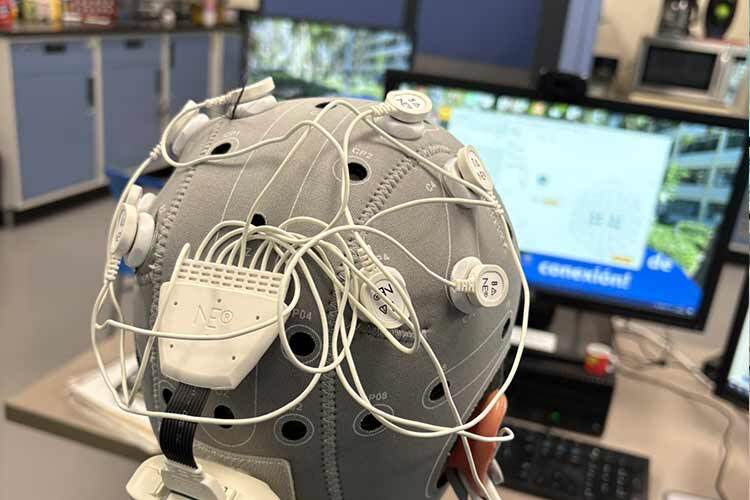Over the years, our physical and mental functions decline; however, a new study published in the scientific journal Multidisciplinary Digital Publishing Institute (MDPI) reveals that an anti-inflammatory diet can reduce cognitive impairment by up to 21%, while one rich in protein can reduce the risk by up to 9%.
First, what is cognitive impairment? Although it is normal that as we age we have a decline in our brain functions, the World Health Organization (WHO) explains that the condition of “mild cognitive impairment” is characterized by memory deficiencies, learning difficulties and reduced ability to concentrate on a long-term, life-altering task that can advance other diseases such as dementia or Alzheimer’s.
Second, the WHO published in 2020 a guide called Risk reduction of cognitive decline and dementia, in which it makes several recommendations, including: being more physically active, not using tobacco, eliminating alcohol, keeping the mind active, seeking social activity, taking care of our weight and keep under control hypertension, diabetes, dyslipidemia, depression, hearing loss and finally, improve our diet”.
This last point, “improve our diet” is related to the new research entitled Anti-Inflammatory Diet and Protein-Enriched Diet Can Reduce the Risk of Cognitive Impairment among Older Adults: A Nationwide Cross-Sectional Research, developed by scientists Liang Wang, Xiaobing Xian, Mengting Zhou, Ke Xu, Shiwei Cao, Jingyu Cheng, Weizhi Dai, Wenjia Zhang and Mengliang Ye, from Chongqing Medical University.
How was the Study Related to the Anti-Inflammatory Diet with Lower Risks of Cognitive Impairment?
It is important to note that this research that relates a lower risk of cognitive impairment to the consumption of an anti-inflammatory or protein-rich diet is based on the population of China.
The researchers obtained the information from the China Longitudinal Health and Longevity Survey (CLHLS) conducted in 2018, which included a sample of 8,692 adults aged 60 years or older, of whom 55% were women and 45% men.
In addition, the researchers applied a Mini Mental State Examination (MMSE), which evaluated the memory and mental acuity of the study participants and whose scores ranged from 0 to 30, with the highest levels of cognitive function.
Another important point was to determine what is considered an anti-inflammatory diet and a rich in protein; according to the study, these are the foods that would make them:
- Anti-inflammatory diet: vegetables, fruits, legumes and their derivatives, nuts and tea.
- High protein diet: lean meats and fish, eggs, dairy products and bean products.
The researchers also took into account factors that may influence respondents’ responses, such as age, gender, residence (urban or rural), educational attainment, and tobacco and alcohol consumption.
The method to calculate the body mass index (BMI) of the participants, “was to divide the weight (in kilograms) by the square of the height (in meters), we also classified their marital status in singles, married, divorced or separated and widowed. Finally, we categorized their sleep levels and respondents self-assessed their satisfaction with life and their health status,” the research details.
What Were the Results of the Study?
This research showed that the risk of cognitive impairment was reduced by 21% in senior Chinese citizens who follow an anti-inflammatory diet and by 9% in those who consume a diet rich in proteins.
It should be noted that the 8,692 participants live in China, have an average of 83 years, are 44.8% men and 55.2% women, who, in their majority (54.5%) had a BMI between 18.5 and 23.9% and much of them (82.6%) live in rural areas.
In addition, the study indicates that the majority had a low educational level (only 20.6% received more than six years of education) and 15% smoked, 14.9% drank alcohol and more than half (53.2%) slept less than 7 hours. With regard to self-evaluation, 97% said they were satisfied with life and 86.5% said they were satisfied with their state of health.
What Do Other Investigations Say?
You’ve probably heard wonders about the impact on brain health that supplements like vitamin E, B, flavonol or ginkgo biloba have; however, a paper published by the University of Cambridge in 2018, mentions that there is no significant evidence showing a strong relationship between these ingredients and an improvement in conditions such as mild dementia or Alzheimer’s.
“Despite pharmacological advances, there are no effective treatments to delay or reverse cognitive impairment,” says the research entitled Effect of dietary interventions in mild cognitive impairment: a systematic review.
That is, there is no conclusive scientific evidence that shows that diagnosed patients can improve cognitive impairment or with the use of medicines, or with the change of their diet.
However, this research points out that “the inflammatory mechanisms and oxidative stress involved in the etiology of cognitive impairment and dementia indicate a potential role of nutrition in its prevention“.
A Lancet research also published in 2018 points out that the Mediterranean diet is associated with better brain health in older adults. Another 2020 study, published by the Alzheimer’s Association, also highlights the benefits of this type of diet.
Other diets that have been associated with healthy cognitive aging are DASH and the so-called MIND, which is a fusion between the Mediterranean diet and DASH and which according to a note published on the website of Harvard University was proposed in 2015 by Dr. Martha Clare Morris.


















